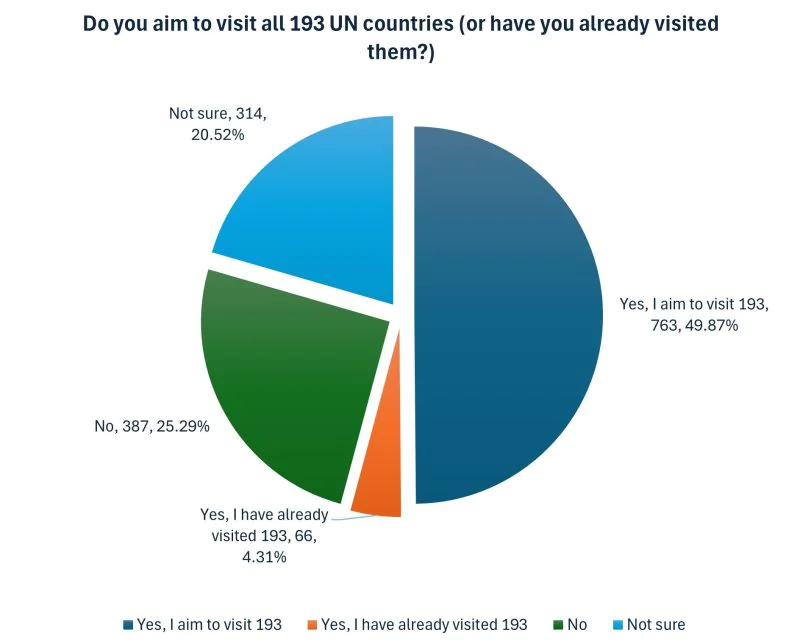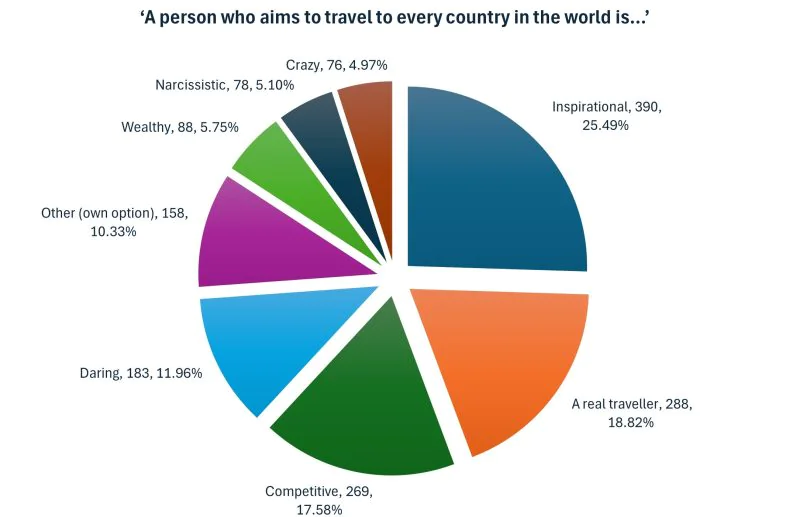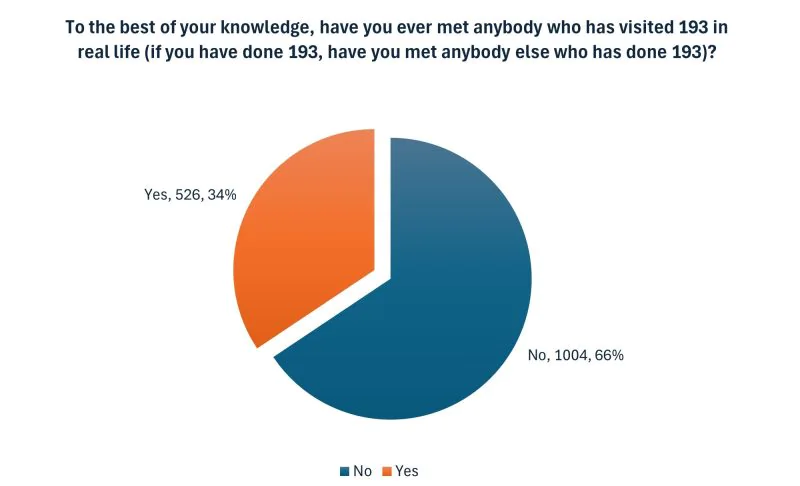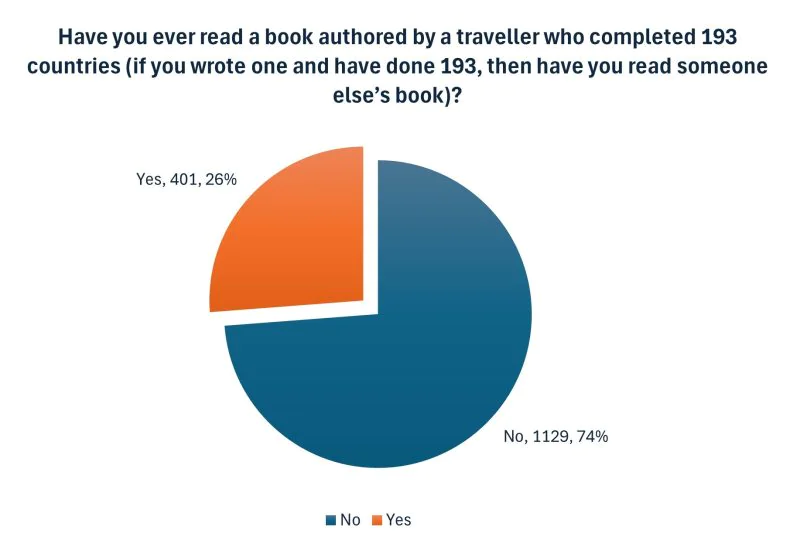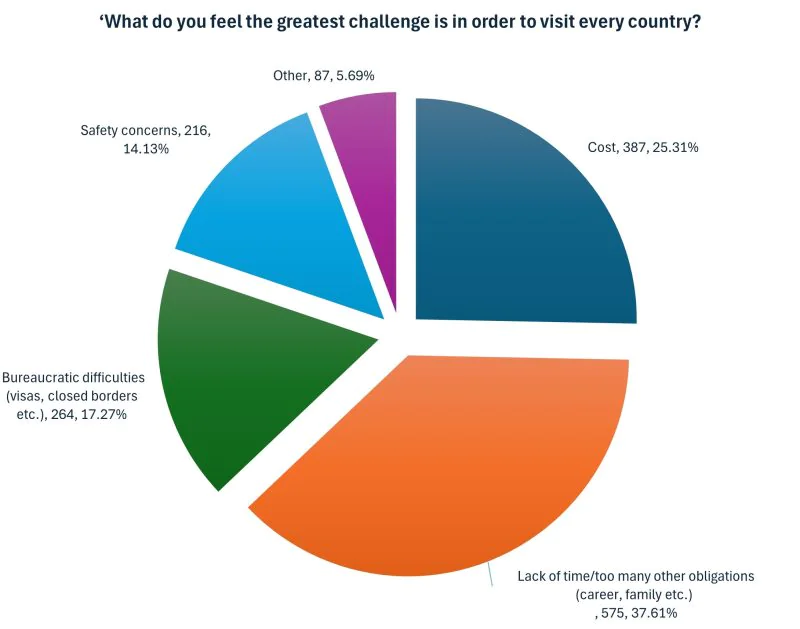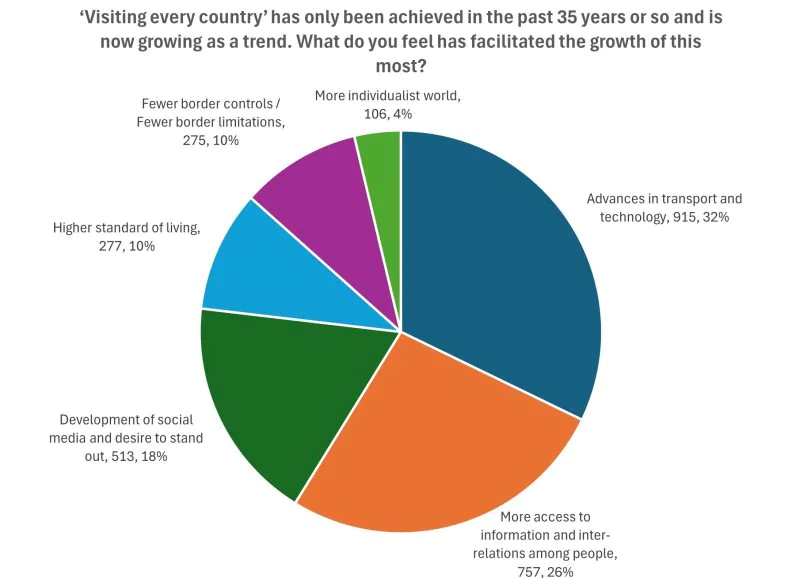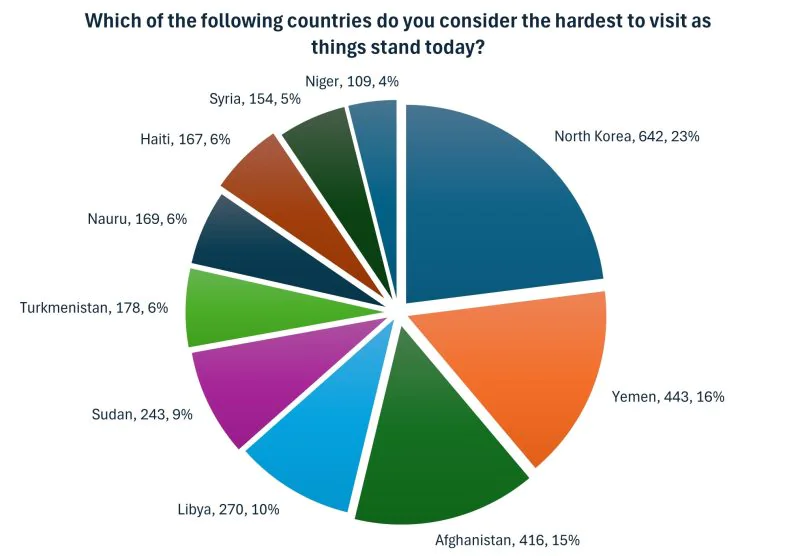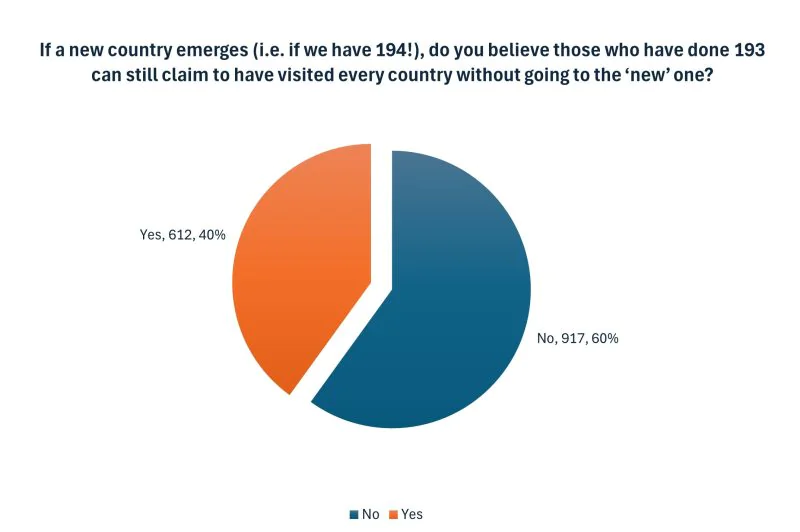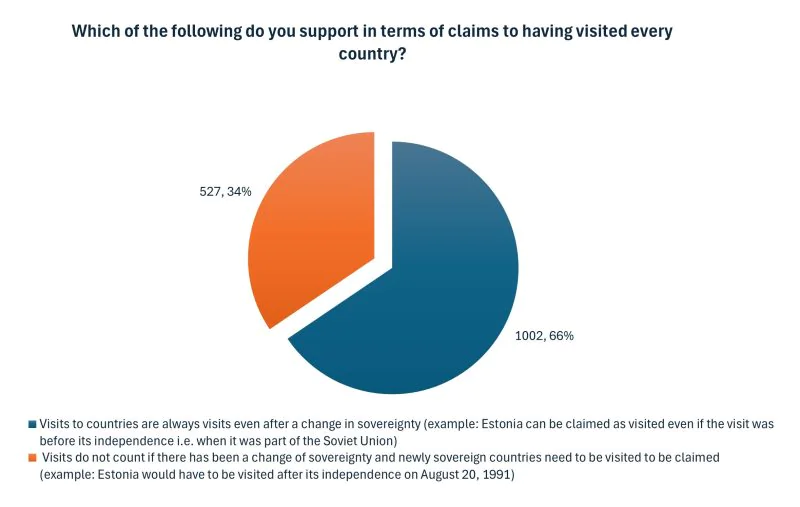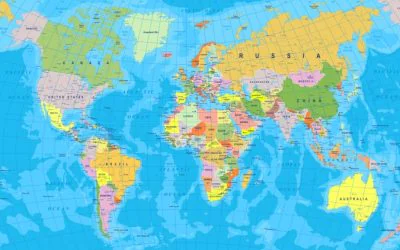At the beginning of January, we launched an extensive poll, engaging our members in a series of thought-provoking questions about the ultimate travel challenge: visiting all the countries in the world. Without further ado, let’s dive deep into the answers of over 1500 travellers who cast their vote on this topic!

Do you aim to visit all 193 UN countries (or have you already visited them?)
Our warmup question was simple – do you aim to join/are you already on our UN Masters List? A significant portion of our members, totalling 763 votes, almost half of the voters in total, expressed an ambition to reach this milestone! It reflects a deep-seated desire for comprehensive global exploration and an unwavering curiosity about the world.
On the other hand, 387 voters expressed no interest in visiting every country in the world. This group might prioritize depth over breadth in their travels, seeking deeper experiences in fewer places, or they might have other priorities and interests that guide their travel decisions. This perspective highlights the varied approaches to travel within our community, where the depth of experience can be as valued as the breadth of countries visited.
Interestingly, 314 voters (roughly 20%) were undecided, highlighting that for many, such an extensive travel goal might be intriguing but daunting, or perhaps not yet a fully formed ambition. This segment represents a group of travellers who are still exploring their boundaries and preferences in travel.
A remarkable 66 voters have already achieved the feat of visiting all 193 countries. According to our report on UN Masters, there are currently around 468 people on this planet who reached the UN 193 goal (including the three newest UN Masters, Kostiantyn Liorek from Ukraine, Osama Al-Awadhi from Kuwait/Finland and Swedish Michael Cederborg). That means over 14% of all UN Masters cast their vote in our poll, providing a unique perspective on this topic!
All answers to this question display a broad spectrum of travel ambitions, from those ambitiously chasing the goal of visiting every country to those who prefer a more selective or yet undecided approach to their global explorations.

Which of the following words best explains your feelings? Choose only ONE of the answers given. ‘A person who aims to travel to every country in the world is…’
In our second question, we asked about our members’ perceptions of individuals who aim to travel to all UN 193 countries. Voters were given 7 options: inspirational, a real traveller, competitive, daring, wealthy, narcissistic, crazy. They could also personalize their answer by choosing “Others” and elaborating on it.
The majority view such individuals as ‘Inspirational’ (390 votes), followed by being a ‘Real traveller‘ (288 votes), and ‘Competitive‘ (269 votes). These top three choices suggest a general admiration for the ambition and spirit of exploration in such travellers. Interestingly, the term “Daring” received 183 votes, reflecting a view of such travel as a bold and adventurous endeavour.
Lower-scoring terms like “Wealthy” (88 votes), “Narcissistic” (78 votes), and “Crazy” (76 votes),” although in the minority, indicate some scepticism or criticism about the practicality or motivation behind such extensive travel.
The ‘Other’ category, which garnered 158 votes, encompasses a wide array of opinions, with ‘Curious‘ leading in the majority of votes. Other notable mentions include ‘Driven‘, ‘Obsessed‘, ‘Ambitious‘, and ‘Determined‘, each reflecting a different aspect of the traveller’s personality and motivations. These varied responses underscore the complexity and individuality of the travel experience. They highlight that the pursuit of visiting every country is seen not only as a physical journey but also as a reflection of personal qualities and aspirations.
Overall, these results present a complex picture where admiration and inspiration are the dominant sentiments, but with a recognition of the competitive nature, boldness, and various personal motivations behind extensive travels.

If you are aiming for or have done 193, please explain under what circumstances, your precise reasons to want to do this and at what age you decided to try to do 193 (and how far along you are). If you don’t aim to try for 193, please explain why you reject this as a travel aim for yourself.
The first open question in the poll let us have a more comprehensive understanding of our voters’ travel ambitions. several trends and themes emerge regarding the desire to visit all 193 countries:
-
Passion for Travel and Exploration
A common thread among the majority of respondents, those aiming for UN 193 and those who don’t aspire to such a goal, is a deep-rooted passion for travel, exploration, and the desire to experience different cultures, landscapes, and cuisines. This passion often stems from childhood dreams or early experiences of travel.
-
Personal Challenge and Accomplishment
For many, visiting all 193 countries represents a personal challenge and a significant life goal. It’s seen as a measure of accomplishment, pushing boundaries, and fulfilling a lifelong ambition.
-
Connection with Local Cultures vs. Ticking Off a List
A notable division exists between those who aim to deeply connect with each country’s culture and those who view the 193-country goal as a checklist. Many respondents expressed concerns that aiming for a numerical target might lead to superficial experiences rather than meaningful cultural immersion.
-
Financial and Time Constraints
A recurring obstacle is the financial and time investment required to visit every country. Many acknowledge this goal as aspirational, potentially unreachable due to these constraints.
-
Safety and Geopolitical Considerations
Safety concerns and geopolitical issues are significant factors for many. Certain countries’ instability or restrictive policies pose challenges to completing the goal.
-
Age and Reasons
Responses vary widely in terms of the age at which people decide to pursue the UN 193 goal. Many individuals begin their journeys in their mid-20s to early 30s, while others begin later in life. Several respondents mention specific life events or turning points that influenced their decision, such as reaching a certain number of countries visited, encountering other extensive travellers, or experiencing a personal or global crisis like the COVID-19 pandemic. Many aim to reach a certain milestone, like 100 or 193 countries, by a specific age or before retirement.
-
Influence of Other Travelers and Communities
Being part of travel communities like NomadMania and encountering other extensive travellers has inspired and motivated many respondents to pursue or consider this ambitious goal.
-
Personal Priorities and Ethical Considerations
Some respondents prefer to focus on personal priorities like family over the pursuit of visiting every country. The desire for sustainable travel and deeper cultural immersion is a recurring theme, challenging the notion of travel as a mere collection of country visits.
In summary, while the goal of visiting all 193 countries is a significant and common ambition among many in the NomadMania community, the approaches, motivations, and challenges vary widely. The trend leans towards a balance between achieving this impressive travel milestone and ensuring meaningful, sustainable, and ethical travel experiences.
Being part of travel communities like NomadMania and meeting other travellers has inspired and motivated many respondents to pursue or consider this ambitious goal.
Some of the specific comments:
193 is not my ultimate aim but a byproduct of it. I’ve just always wanted to see the whole world. Ever since I was a small child of 3 or 4. I knew from about age 9 or 10 that I wanted to travel everywhere, but slowly, so I could really experience every bit. I started travelling on my own (independently and solo) when I was 16. I am now almost 36 and have only been to 98/193, but have been to about 418 or 420 of 1301 NomadMania regions, which is more representative of how I travel. I am also happy to go back to places or stay in places and explore them more thoroughly. So I expect one day I will get to 193, but mostly just accidentally as I try to see the whole world.
During the pandemic, I realised my desire to travel the world. I originally wanted to see all 193, and still would, if the chance presented itself, but after travelling to 34 countries so far at age 29, I’m very specific on the places I really want to see, and I’ll be at around 100 countries if I see all the ones I plan to. Once I reach that point, I might push forward to 193, but I might not. I’ve done a lot of research on every country in the world and there are some countries, like some in the Pacific Islands, that simply offer me nothing I haven’t already experienced. If money wasn’t an issue, I would visit all 193 without hesitation.
I am aiming for 197, the reason I am doing it is that I found it an exciting way to “gamify” my love for travel. I am at 93 countries now and the task is quite challenging with a Low Index Passport and a limited number of leave days per year when you have a full-time job. I still like to pursue that target even though it would take many years to achieve. No one from my country has ever done it.
I didn’t use to be interested in visiting all the countries, just all the ones that could offer me something that I deemed interesting, beautiful, or fascinating. Nonetheless, after meeting other Nomadmanians, having conversations about their own adventures visiting all 193 (and reading Boris Kester‘s book), I became convinced that each country in the world has something unique and interesting to offer, even if it does not seem apparent at first glance. So now, at age 39, I am interested in visiting all of them in a way that is sustainable for me, under no certain timeline. I don’t need to rush to check them all off. I would rather do this gradually, as life permits, and good opportunities come along.
I grow up in a family working with railways and I have always planned trips and like that. I started to hitchhike when I was 19 and liked it so much and have always travelled and wanted a job where I could travel around the world and I managed. It gives me freedom to talk to nice people, stay at families with different cultures and experiences. I am now 77 and still travel almost the same way, as I am 19. I have been to 120 countries and will accelerate my travel now.
In early 2020, I was diagnosed with an aggressive HER2+ Triple Negative Breast Cancer. Then Covid hit, and I was in mandatory isolation for over one year as I did chemo, surgery, radiation, and immunotherapy … plus then had to heal from lymphedema which was another year of therapy. During my battle, I dreamed of travelling and exploring nature with the ones I love. I discovered Nomad Mania during this time and I got inspired to attempt to see as much of the world as possible. As a breast cancer survivor, I treat every day as a gift. That said, I hope to get to all 193, and I am having a lot of fun exploring along the way. For me, it is a marathon, not a sprint. I am currently at 23 countries and I added 10 new countries in the last year, plus Antarctica. I am inspired by Jessica Nabongo and her blog and book The Catch Me If You Can.

To the best of your knowledge, have you ever met anybody who has visited 193 in real life (if you have done 193, have you met anybody else who has done 193)?
This question explored whether our community members have ever met someone who has visited all 193 countries. Out of the total 1,530 respondents, a significant majority of 1,004 (about 65.6%) indicated that they have not met anyone who has achieved this feat. This disparity underscores the uniqueness of completing such an extensive travel goal. It highlights that, even among a community of seasoned travellers, encountering someone who has visited every country is an exceptional experience.
Have you ever read a book authored by a traveller who completed 193 countries (if you wrote one and have done 193, then have you read someone else’s book)?
The second question probed whether our members had read a book authored by someone who had travelled to all 193 countries. Again, the majority, with 1,129 respondents, had not read such a book, while 401 affirmed they had. This result suggests that while the tales of such extensive travels might be compelling and inspiring, they are not widely circulated or read, even among a travel-savvy audience like NomadMania’s members.
The lesser engagement with literature authored by UN Masters suggests an opportunity to increase awareness and interest in the stories and insights of those who have achieved this feat, highlighting both the rarity of this travel achievement and the potential for greater exploration and discussion within our network.

What do you feel the greatest challenge is to visit every country?
When it comes to obstacles on the quest to reach all UN countries, the most voted challenge, with 575 votes, was “Lack of time/too many other obligations (career, family etc.).” This suggests that for many, balancing travel aspirations with personal and professional responsibilities is a significant hurdle. The second most common challenge, noted by 387 participants, was the cost associated with such extensive travel. Bureaucratic difficulties, like obtaining visas and dealing with closed borders, came third with 264 votes, underscoring the logistical complexities of global travel. Safety concerns were also notable, receiving 216 votes, reflecting apprehensions about travelling to certain regions.
Interestingly, 87 voters chose “Other” and elaborated on their choices, often mentioning a combination of the listed challenges rather than a single dominant factor. This indicates that for many in the travel community, the journey to visit every country is obstructed by a complex mix of financial, logistical, safety, and personal constraints. The varied responses also highlight the individual nature of travel, where each person’s circumstances and priorities uniquely shape their experience and challenges in global exploration.

Based on all the people we know of who claim to have visited every country – unverified numbers – we have the following. Women 52; Men: 302, a ratio of 1:6. Why do you think there are comparatively so few women compared to men who have visited every country?
The question of the ratio of female to male UN Masters was definitely the one that caused the most heated discussion among our members. Summarizing our community’s responses regarding why comparatively fewer women than men have visited every country, several key trends emerge:
-
Safety Concerns
The most common reason cited centres around safety. Many respondents feel that women face greater risks when travelling, especially alone, due to issues like harassment, cultural and religious restrictions, and general safety in certain regions. This heightened concern for personal safety significantly influences women’s travel decisions and destinations.
-
Cultural and Societal Expectations
A recurring theme is traditional gender roles and societal expectations. Many responses point out that women are more often expected to take care of children and elderly family members, which can limit their ability to travel extensively. Additionally, some cultures may not encourage or support women who wish to undertake such ambitious travel goals.
-
Economic and Career Factors
Respondents also highlighted economic reasons, stating that women may have less financial freedom than men, which impacts their ability to travel extensively. These economic constraints such as lower average salaries for women and a focus on career and domestic responsibilities over extensive travel are seen as a major barrier to achieving the goal of visiting every country.
-
Competitive and Narcissistic Traits in Men
Several respondents mentioned that men might be more driven by competitive instincts and a desire to boast about their achievements, including travel. This mindset could make men more inclined to pursue the goal of visiting every country as a form of achievement or status symbol.
-
Perception of Risks and Adventurousness
Several respondents believe that women are generally more risk-averse or less interested in extreme travel. This perception could be influenced by both actual safety concerns and societal norms about acceptable behaviour for women.
-
Access and Restrictions
Restrictions in certain countries for solo female travellers, coupled with concerns about societal judgment and stigma associated with women travelling alone, particularly to less conventional destinations, seem to limit opportunities for extensive travel.
-
Historical Context
Some respondents note that historically, men have had more opportunities and encouragement to travel, especially solo, and this legacy continues to influence current trends, in contrast with the historical underrepresentation of women in travel
-
Evolution of Travel Trends
Some responses indicate that the trend might be changing, with more women engaging in extensive travel, inspired by social media and increased visibility of female travellers. According to our report, more than half of the total female UN Masters have achieved it in the past five years, which proves the expectation for a longer-term equalisation of gender.
In summary, the answers reflect a complex interplay of safety concerns, societal expectations, economic factors, and cultural norms that contribute to the significant gender disparity in extreme travel. However, there’s optimism that as societal attitudes evolve and more women engage in solo travel, this gap may narrow in the future.
.Lucy Hsu completed UN 193 last year. In 2023, of the 50 new UN Masters on our list for 2023, 14 are female, giving hope for a longer-term equalisation of gender.
Some of the specific comments:
1) More difficult and dangerous for women to travel alone, especially overland travel in cheap accommodations 2) Women are more likely to stay home and support a husband’s efforts to achieve this goal than a man is likely to stay home and support his wife’s travel goals
A few reasons: women (unfortunately) earn less money than men. There are many places in the world where a woman would not be comfortable walking around on her own, whereas a man wouldn’t even give it a second thought. Women are taught that their ultimate role is having and raising children (even in Western countries), and even without their own kids, many women are pressured into helping out with other people’s children in a way that men never would be. A man visiting every country would never be asked “What about the kids at home” – for women, it would be the first question asked. And generally speaking, men are more likely to brag about their accomplishments.
After discussing this question with my wife, I can think of three factors that may contribute to the low number of women on the list of 193: Some cultures are not very welcoming to women. In some of them, women are treated like second-class citizens, to the point that local men refuse to talk to them. In others, they are seen as ‘easy prey’ for advances and street vendors. For these reasons, women travelling alone may avoid visiting these countries. The situation is similar when it comes to safety: Most women have a higher need for security than men when they travel. Last but not least, men are much more eager to compete in (sometimes senseless) competitions – for example, visiting all 193 countries in the world without exception, especially if you don’t really care about many of them.
As a woman who has been to 98/193: so many reasons. 1) the obvious safety issue/the fear of it, though that has never stopped me; 2) honestly, men make more money than women at a younger age. Makes it easier for them to start travelling sooner; 3) there are just more men travelling in general. Makes it easier to get a cheap ride/share a berth on a cruise to difficult to get to destinations as a man; 4) (I think this may actually be the biggest factor) women tend to become more ensnared in familial responsibilities than men (whether to their own kids, their parents, or their siblings), making it harder for them to take long times away. We are so conditioned from a young age to put ourselves second and others first (whereas men as usually conditioned a little more the other way) and it honestly makes it so hard to take time for yourself as you get older.
Historical Trends: In the past, travel, especially extensive and adventurous travel, was often dominated by men. Traditional societal roles and expectations may have limited women’s opportunities for such exploration. Safety Concerns: Women may face additional safety concerns or perceived risks when travelling to certain regions, which could influence their decision to visit certain countries. Cultural and Societal Constraints: Cultural norms and societal expectations may impact women’s ability or willingness to undertake extensive global travel. Responsibilities at home or cultural expectations about women’s roles might limit their opportunities for long-term travel. Economic Factors: Economic considerations play a role in travel, and men may have historically had more economic opportunities that enabled extensive travel. Reporting Bias: The numbers may be influenced by reporting bias. Men might be more prone to share their achievements or adventures publicly, while women might be less inclined to do so.
So many reasons. I’m coming from a place of a female traveler here, who feels very divided about this and I’ve thought about this a lot myself. First, travelling as a woman solo to some countries is rumoured and projected to be pretty unsafe if you’re younger than 50. That’s a huge deterrent for women to even set that goal in the first place. Women are taught to be afraid or wary of strangers and get themselves into situations that might turn out badly, so it costs more money to avoid those situations. Example: Men can easily do things like jump in the back of a truck with a bunch of strangers and hitchhike, or do wild camping with minimal fears of being disturbed. I did all of those things with my dad growing up, but he was VERY clear I should never do that without someone else to watch my back. To someone looking to do harm (steal, assault, con) Women are seen as easier targets. Another reason is the timeframe. Women who take “gap years” to travel are usually start the workforce extremely behind, and then they fall further behind if they want to have children. You lose years of your life in your prime (one year while pregnant, and the next year recovering and on infant duty/breastfeeding/postpartum, etc). where extensive travel is difficult, and then there’s the exponential cost of travelling with your children once they are born. There’s a window of time for older women – where they’re old enough to command respect from the younger generations and they still have their health to engage in the travel actively and have money to do so, but that feels uneven as well.

‘Visiting every country’ has only been achieved in the past 35 years or so and is now growing as a trend. What do you feel has facilitated the growth of this most? Please pick only TWO of the answers.
This question aimed to shed light on what factors are believed to have most contributed to the growing trend of visiting every country in the world, a feat achieved only in the past 35 years.
The majority of respondents (915 votes) identified “Advances in transport and technology” as a primary enabler. This shows how the evolution of transportation – faster flights, more routes, and improved infrastructure – coupled with advancements in technology, such as mobile apps and online booking platforms, have made it easier than ever to traverse the globe.
Not far behind, with 757 votes, was “More access to information and inter-relations among people”. This choice reflects the impact of globalization and the internet, which have brought a wealth of information to our fingertips. From learning about remote destinations to connecting with fellow travellers and locals worldwide, the barriers to accessing and sharing travel knowledge have significantly lowered.
“Development of social media and desire to stand out” with 513 votes emphasizes the role of digital platforms in inspiring and showcasing travel experiences. Meanwhile, “Fewer border controls / Fewer border limitations” and “Higher standard of living” each with 275 votes, were not as predominantly viewed as primary enablers. This suggests that the shift towards global exploration is more technologically and information-driven, underlining the transformative impact of the digital age on our travel aspirations and capabilities.

Which of the following countries do you consider the hardest to visit as things stand today?
This question examined the perceptions of travellers regarding the accessibility of countries and travel challenges worldwide.
North Korea, Yemen, and Afghanistan owning the podium
Topping the list is North Korea; selected by 642 respondents. This choice is unsurprising, given the country’s strict travel restrictions, political isolation and the fact that it has remained closed to travellers since the COVID-19 pandemic.
The second most chosen country, Yemen, was picked by 443 participants, followed closely by Afghanistan chosen by 416 travellers. Both countries have gained their reputation over the years due to their political instability and security risks.
Interestingly, the above countries together cast over half of the total votes (54%).
Other challenging destinations
Libya, which according to our report is the most popular “last country” among UN Masters, gathered “only” 270 votes , followed by Sudan with 243 votes. Both have been impacted by internal conflicts and political turmoil. Turkmenistan, which reopened late post-pandemic, received 178 votes, highlighting the challenges posed by restrictive visa policies and limited access.
Nauru received 169 votes, despite its remote location and limited transportation options. This indicates that safety and political issues pose greater challenges for ambitious travelers than mere remoteness. Haiti, with its political instability and natural disasters, ended up with 167 votes. Syria, impacted by years of conflict, was for a long time inaccessible to many. However, due to recent changes, it is not considered as difficult to visit anymore, receiving 154 votes. Closing the list is Niger, with 109 votes.
This clearly illustrates that political instability, safety concerns, and restrictive travel policies are the primary factors making certain countries challenging destinations for travellers.

Many travellers consider more than 193 as their legitimate travel aim for ‘every country’. Which of the following do YOU feel is the most legitimate?
This question was created to help us understand what constitutes the ultimate travel goal of visiting ‘every country’ in the world. With a range of answers that extend beyond the standard list of UN 193, our community’s responses reflect diverse perspectives on what counts as a legitimate travel achievement.
197 ( 195 + Kosovo + Taiwan) and UN 193 casting half of the votes
The most popular choice, with 473 votes, was 197 countries, including all full UN members plus Kosovo and Taiwan, recognized by several other countries as de facto independent. This choice suggests a nuanced understanding of global geopolitics and an appreciation for nations that, while not universally recognized, hold significant independent status.
In contrast, the traditionalist view of 193 full UN members as the definitive list garnered 292 votes, indicating a considerable number of travellers who adhere to the formal international recognition criteria.
Other approaches
Interestingly, a substantial group (276 votes) expanded their list to approximately 260, incorporating territories like Greenland and Hong Kong, highlighting a desire to explore beyond conventional national boundaries.
A notable 106 respondents included Western Sahara in their list, making it 198 countries, while the inclusion of entities like Somaliland and Abkhazia pushed the count to approximately 205 for 96 travellers. The Travelers Century Club‘s extensive list of 330 ‘countries’ found favour with 150 participants, illustrating an adventurous and comprehensive approach to global exploration.
Diverse and unique criteria emerged in the ‘Other’ category, where personal goals varied from UN+ specific combinations, and FIFA associations, to even considering each self-describing ethnic group as a separate entity. This highlights an individualistic and subjective approach to world travel, emphasizing personal goals over conventional lists.
In summary, while the UN member list remains a popular standard, there is a growing interest in acknowledging lesser-recognized states and territories, indicating a broadening perspective on what constitutes a ‘country’ in the eyes of the global travel community.

If a new country emerges (i.e. if we have 194!), do you believe those who have done 193 can still claim to have visited every country without going to the ‘new’ one?
The results for this question reveal a clear trend: a majority of the respondents, with 917 votes (60%), believe that visiting every country means keeping up with the current number of recognized sovereign states. This perspective underscores a commitment to the completeness of the travel experience, suggesting that for these voters, the achievement of visiting every country is a dynamic goal that evolves with geopolitical changes.
On the other hand, 612 participants (40%) voted ‘Yes’, indicating a belief that those who have reached the milestone of visiting 193 countries can still claim the achievement of having visited ‘every’ country, even if a new one emerges. This group seems to view the accomplishment in a more fixed context, based on the world map at the time of their achievement.
This divide in opinion reflects the broader debate within the travel community about the nature of such achievements and whether they should be considered as milestones fixed in time or ongoing quests that evolve with the world’s political landscape.

Which of the following do you support in terms of claims of having visited every country? (This was asked in a NomadMania referendum in 2018 but we feel given the significant growth of our community it is a good time to ask it again).
The poll presented two options: Option A stated that visits to countries should always count even after a change in sovereignty (For example, a visit to Estonia would be considered valid even if it occurred before its independence when it was part of the Soviet Union). This option received a notable majority of votes, with 1,002 members supporting this view.
On the other hand, Option B argued that visits do not count if there has been a change of sovereignty and that newly sovereign countries need to be visited again to be claimed. (In this view, Estonia would need to be visited after its independence on August 20, 1991, for the visit to count). This perspective garnered 527 votes, indicating a significant number of members who favour a more stringent approach to country counting.
What is interesting here is that this result is exactly the same as the ‘referendum’ we had in 2018 – where again 66% believed that visits are ‘always visits’. The trend in the poll results suggests a leaning towards a more inclusive approach to country visits, aligning with NomadMania’s focus on visited regions rather than ticking off countries.
A majority of the respondents seem to value the historical context of their travels, recognizing visits made before changes in sovereignty as valid. This viewpoint appreciates the evolving nature of world geography and national borders over time. The substantial minority advocating for a more current and strict interpretation, emphasizes the importance of recognizing the present-day sovereignty and borders of nations in travel achievements.

Final Thoughts
The diverse and insightful responses from over 1500 global travellers paint a vivid picture of the modern travel landscape. The desire to visit every country is balanced against practical realities such as financial and time constraints, safety concerns, and personal priorities. The community’s views on the nature of this travel goal – whether it’s seen as a dynamic, evolving challenge or a fixed milestone – reflect the ever-changing geopolitical landscape and the personal nature of travel achievements.
In essence, the poll and its results serve not only as a snapshot of current trends but also as a compass pointing towards the future of global travel. They highlight a community that values both the journey and the destination, cherishing each travel experience as a unique chapter in their personal book. As we navigate this ever-expanding world, the spirit of adventure, curiosity, and respect for diverse cultures and experiences remains the guiding star for travellers everywhere.


